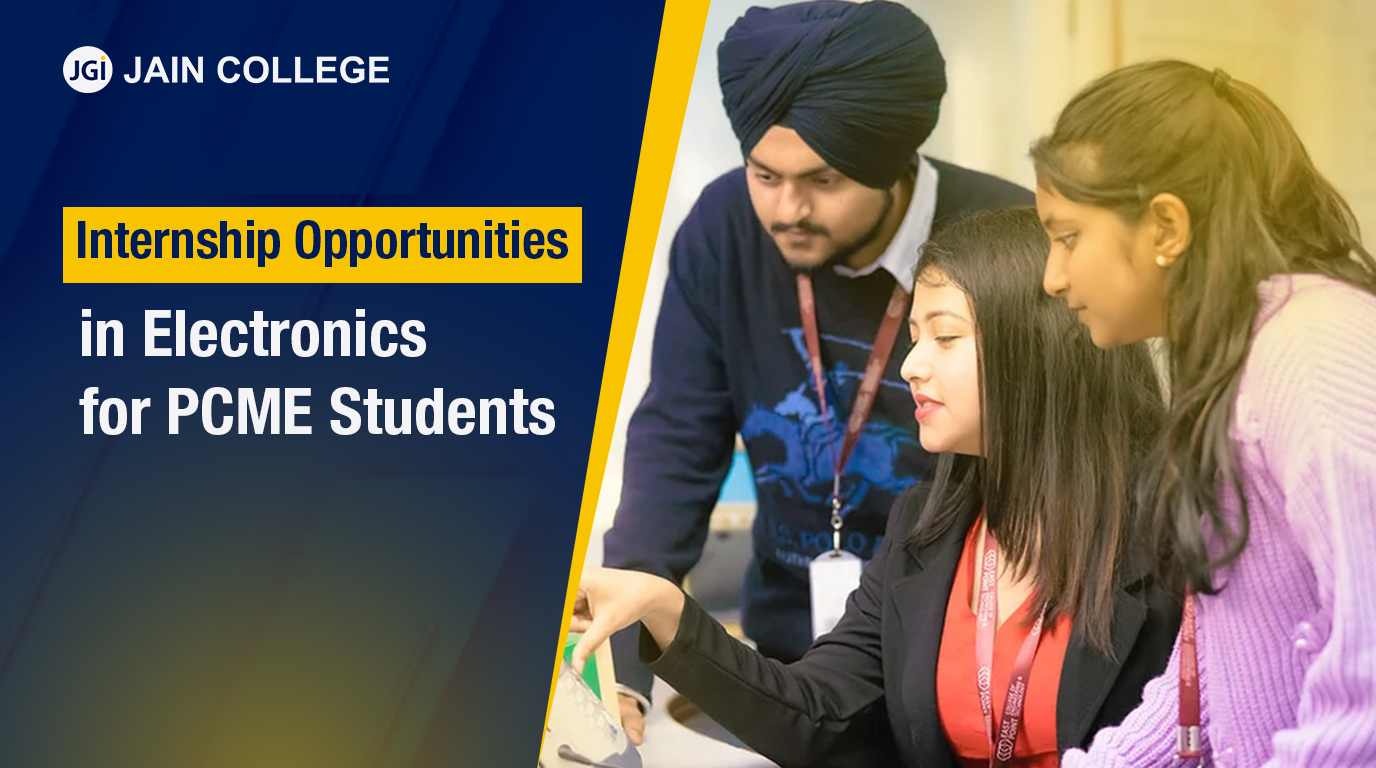
In today's rapidly changing technology landscape, students with a PCME background stand at the unique intersection of theoretical knowledge and practical application.
AI tools are now helping match students with internship opportunities that align with their skill sets and aspirations connecting bright minds with real-world experience in fields like embedded systems, circuit design, IoT, robotics, and more.
AI does not just recommend internships, it can personalise suggestions based on your coursework, interests, and career goals.
Are you a PCME student looking to turn your passion for electronics into real-world experience? Whether you are fascinated by how gadgets work, love building circuits, or dream of designing smart tech, internships in electronics can be your launchpad.
Let us dive into what these internships offer and why they matter for your future.
An internship is a short-term work experience offered by organisations to freshers or recent graduates to gain practical skills and knowledge in a specific field. An internship provides a chance to learn, explore career options, and develop valuable skills that can be useful for future employment.
There are various forms of internships, which are broadly categorised based on compensation, duration, and focus. Some of these include:
An internship is a professional learning experience that different organisations offer to help students or recent graduates gain practical work experience related to their career interests or fields of study.
Some of the other benefits of internships are:
Internships provide opportunities to learn new skills, refine existing ones, and gain practical experience.
They can help individuals explore different career paths and determine their interests and aptitudes.
Internships offer valuable networking opportunities, allowing individuals to connect with professionals in their field.
Many companies use internships as a way to identify and recruit potential employees.
The first step towards finding an internship is to identify one's goals and interests, then research potential opportunities and tailor applications.
Leverage the network, utilise online platforms, and prepare for interviews.
Here is a more detailed breakdown.
To find internships, leverage online job boards, social media platforms, and networks.
Consider using many job portals or platforms like LinkedIn, Indeed, and Internshala for internship listings and apply directly to company websites.
Attending job fairs, exploring electronics company websites and university career services and networking with your network can also lead to opportunities.
For electronics internships, in-demand skills include programming proficiency, digital design knowledge, embedded systems and more.
Here is a detailed breakdown of In-Demand Skills:
These skills are crucial for working with hardware, software, and embedded systems in this specialisation.
As a PCME student, having an analytical mindset and diverse skill set makes them a strong candidate for many exciting internships.
Do not wait for an opportunity, build the circuit that leads to it!
Ready to apply for internship opportunities in Electronics?
Start exploring and let your curiosity guide your career! Start small, stay curious, and build your skills one wire at a time.
Would you like help finding or preparing for an internship?
Need Guidance in Internship Opportunities in Electronics for PCME Students?
Feel free to reach out to our Academic / Career Counsellors to find the best career path for you!
Visit our website @ https://www.jaincollege.ac.in/blogs
Shape Your Future with JAIN College's Integrated Programmes!
For further information and related articles on the internship opportunities in Electronics for PCMC students, read our blogs.
Frequently Asked Questions (FAQs)Electronics internships are generally open to students or recent graduates or freshers who enjoy circuits, gadgets, or coding. Most internships welcome learners who are curious and willing to get hands-on.
Not at all! Basic knowledge of electronics, maybe a little coding (like Python or C), and a willingness to learn go a long way. Internships are for learning, not perfection. Accordingly, the need for technical skills in internships varies significantly depending on the specific role and industry.
Many different types of companies offer internships, from large multinational corporations to smaller startups. Other sectors including tech labs, manufacturing units, and even research centres offer internships. Thus, students/freshers can find opportunities in domains like robotics, IoT, circuit design, and embedded systems.
To find internships, start with online job platforms like Internshala, or college placement cells, and utilise professional networking platforms like LinkedIn. Also, talk to your professors, they might often have industry contacts or project leads.
Yes. Some internships are paid, and some offer only experience. However, internships deliver students/freshers with essential skills that can help them land a great job later. Experience is the real currency here.
Your resume is an important part of securing your dream internship. Thus, highlight your school projects, technical skills, and any experiments or projects you have done on your own. Even building a simple robot at home counts!
The earlier, the better. Many internships fill up quickly, especially summer ones. As a result, it is recommended to apply when the recruiting season starts. To maximise your chances of securing an internship, start applying in between December and March.

JAIN PU College, a part of the renowned JGI Group, is committed to empowering students with quality education.
Beyond academics, the college ensures its online content reflects the same standard of excellence. Every blog and article is meticulously vetted and proofread by subject matter experts to ensure accuracy, relevance, and clarity. From insightful educational topics to engaging discussions, JAIN PU College's content is crafted to inform, inspire, and add value to its readers, reflecting the institution's commitment to intellectual growth and innovation.
View all Blogs